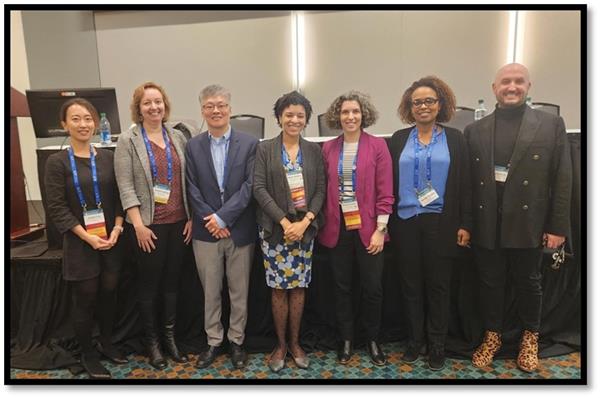
For decades, STEM professionals have expressed concern over “leaks” in the STEM career pipeline that contribute to a lack of overall diversity. The pipeline metaphor contends that individuals from historically excluded groups tend to “drip out” as they rise in their careers. Historical efforts to address this have focused on patching up the holes and assumed a passive and universally straightforward line to career achievements. At the 2023 SOT Annual Meeting and ToxExpo, the Workshop Session titled “How to Be an Active Ally and Upstander for Promoting an Inclusive Environment in Toxicology” addressed several of the shortcomings and myths surrounding this well-meaning but flawed analogy.
Dr. Meredith G. Hastings of Brown University, the Workshop speaker, argued that the STEM pipeline metaphor is passive in that it ignores the hazards and factors that actively push people out. In contrast, the current STEM career development journey is more akin to an obstacle course where everyone’s hurdles are uniquely tied to their identity and how that identity is perceived externally. Dr. Hastings went on to say that while there are no easy fixes for the current climate, we can all begin by challenging our biases and recognizing our role in building more inclusive work and education spaces. Some examples of questions that you may want to ask yourself include (1) from where your perceptions of other groups and identities originate, (2) how your perceptions of certain groups benefit or negatively impact others, and (3) whether diverse perspectives are represented by the individuals in decision-making positions at your organization or institution.
Individual awareness, of course, is only part of the solution. Organizations can do their part by utilizing bystander intervention trainings, valuing labor of care (e.g., professional service on diversity, equity, and inclusion committees) as much as technical labor, and establishing enforceable codes of conduct that set expectations for acceptable conduct and actively deincentivize inappropriate behaviors such as bullying and harassment. Dr. Hastings also shared that current training methods assume a universal trainee baseline and take a one-size-fits-all approach that doesn’t work for everyone. Reinventing training approaches to provide experiences that actively develop the skills valued in prospective job candidates would be another step toward equity and inclusion in STEM.

The author (center) and other panelists for the
Workshop Session “How to Be an Active Ally and Upstander
for Promoting an Inclusive Environment in Toxicology
At the end of the Workshop, a diverse panel of SOT members—Dr. Greg M. Landry, Dr. Nardos Tassew, Dr. James Kim, and myself—convened to discuss what allyship meant to us and how individuals and organizations can become better allies. Collectively, the panel shared stories of when their institution, supervisor, or colleague showed active allyship by challenging microaggressions in their workplace and offering support in difficult situations. The panel also reminded attendees that if organizations want their staff and students to come forward with comments and concerns, the organizations must first ask themselves if they’ve truly created a safe and inclusive space for such honesty and vulnerability. If vulnerable parties are afraid of retaliation or that their personally lived experiences will be curtly dismissed, they will be hesitant to come forward, and institutional issues are likely to persist.
Again, there are no quick or easy fixes to creating a diverse, equitable, and inclusive space in toxicology but—as presented by this session—there are a multitude of steps that we can take on the individual and organizational levels to build our allyship toolkits and work toward a more inclusive world.
This blog reports on the Workshop Session titled “How to Be an Active Ally and Upstander for Promoting an Inclusive Environment in Toxicology” that was held during the 2023 SOT Annual Meeting and ToxExpo. An on-demand recording of this session is available for meeting registrants on the SOT Online Planner and SOT Event App.
This blog was prepared by an SOT Reporter and represents the views of the author. SOT Reporters are SOT members who volunteer to write about sessions and events in which they participate during the SOT Annual Meeting and ToxExpo. SOT does not propose or endorse any position by posting this article. If you are interested in participating in the SOT Reporter program in the future, please email SOT Headquarters.
#Communique:ScienceNews
#2023AnnualMeeting
#Communique:AnnualMeeting
#SOTReporter